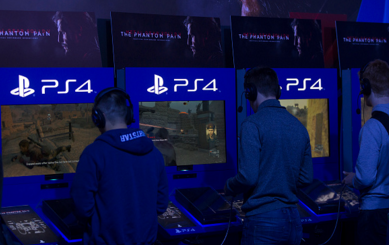The Metal Gear series is far from normal. Each game adds a new level of bombast and convolution to an already-confusing storyline. Every iteration of the game presents a radically different style of gameplay as well, and each experimentation leads to better results. Gameplay coupled with endearing characters placed in impossible situations has had a lasting appeal on practically everyone who plays these games.
In many ways, Metal Gear Solid 5: The Phantom Pain is no different. MGSV is one of the most entertaining and challenging games I’ve ever played. There’s practically an infinite number of ways to tackle each mission. The game encourages the player to explore their options. Whether you’re Naked Snake, Macgyver or Rambo, the game will let you play however you want.
For many people, this is good enough. But for a lot of Metal Gear fans, MGSV was a big disappointment. The heart of the issue was the dissonance between the story and the gameplay. Ridiculous story has never been a problem in the MGS games, and it isn’t the problem with this one. There simply is no such thing as “beyond all reason” in a Metal Gear game. This is a series where you’ve fought multiple bipedal nuclear launchpads, an electrokinetic Russian colonel, ghosts, a man who could control bees, a vampire and your dead twin brother. Any MGS fan has dealt with their fair share of nano-machines, artificial intelligence and secret organizations. What makes MGSV disappointing is that it lacks the balance between comedy and tragedy every other MGS game got right.
Characters we’ve known for years have suddenly become stoic and one-dimensional — they don’t belong in any MGS game. There’s no compelling feel to the story because it’s hard to care about the characters. What made MGS3’s story about Snake and the Boss so compelling was how real that connection felt. The game didn’t just drop characters on us and tell us to how to feel about them. Players learned to care about the characters through their lighthearted conversations. This character development feels organic as well as entertaining.
The first thing everyone notices about MGSV is that Snake never talks. Not in gameplay, not in side missions, not in debriefing, not in response to intel, not even in key scenes where people are clearly trying to have a conversation with the guy. It’s been the fundamental tool in character-building in every single Metal Gear game, and Konami took it away. Instead of Codec calls you get one-sided cassette tapes where Kaz struggles to figure out the convoluted plot of the game.
This sets the tone of the game. It’s the kind of game the protagonist doesn’t want to be a part of, so we don’t want to be a part of it either. It’s still over-the-top Metal Gear goodness, but I don’t have a reason to care.
In other MGS games, even when we don’t connect with the protagonist, other characters kept us connected. In MGS: Peace Walker, Kazuhiro Miller keeps you grounded as the lighthearted mercenary who genuinely wants peace. MGSV’s Venom Snake, by contrast, is literally fueled by player action. He moves because we want him to move, and that’s it. Kaz’s obsession with revenge translates into a manic distrust of everyone. Ocelot tries to act like the grounding character, always calm, but this comes off as unsettling. All that’s left is our side kick Quiet, whose total silence, coupled with scanty armor, really says it all. In terms of gameplay, MGSV is sexy, but Snake and Quiet can’t speak because they have nothing to say.
letters@chronicle.utah.edu


